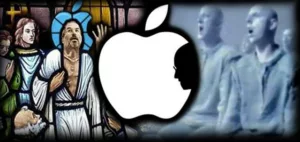In his book American Gods, Neil Gaiman brought up the notion that modern gods are struggling to replace the old ones. Atlas Obscura asked a cultural historian to take a closer look at Apple Stores to see if they are modern day temples of worship. In the article release dates are compared to feast days, where crowds gather in front of a church to commemorate a saint or holy event.
Nowadays, we have Apple Release Day—the Feast of St. Jobs—when faithful customers gather outside Apple stores and await the renewal of a next generation iPhone.
Erica Robles-Anderson, a professor at New York University studying the role of media technology in the production of public space, was asked to see if Apple stores are like sacred places. “We forget that cathedrals were basically high end technology,” she says, adding that “People have used technology for a long time to speak to the gods,”
She continues to explain how Apple has managed to combine communal rituals with the individual experience, creating an affiliation to the brand.
Taking a look at the architecture and design of the SoHo Apple Store, Robles-Anderson compared the shop to a temple. The broad steps leading to large and intimidating doors, and the bright interior with a wide staircase in the middle are typical for places of worship.
It creates a space that emphasizes your smallness when you walk in. You look at something far away, and that makes your body feel like you’re entering somewhere sacred or holy.
The products are arranged around the periphery, with no aisles or cabins to cut you off from the rest.
You’re always seeing others and being seen by others. And the ways that any employee can serve you feels personal, but it’s going on all around you, in a cacophony of like-mindedness.
The second floor serves a different purpose. It is darker and more inviting, in contrast to downstairs, more intimate. This is where Apple’s equivalent to priests, Geniuses, take to the stage and “impart knowledge”.
Robles-Anderson’s analysis might seem a little dramatic, she goes as far as comparing the Apple Brand to a cult, which considering the devotion some customers direct towards the brand could be true. Of course every corporation has a right to optimize its sales and Apple has created a sense of loyalty among its users that is unique and worth applause, but theocratic regimes do tend to degenerate with time.








